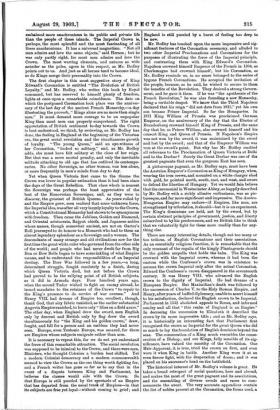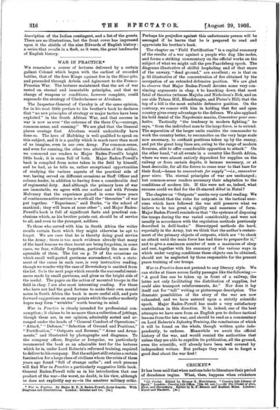THE CORONATION AND THE EMPIRE.* AN anonymous French writer, says
Mr. Bodley, described the King's Coronation as "a splendid anachronism." Mr. Bodley, after making a retort, amply justified by the hearty welcome the Parisians gave to the King, epigrammatically remarks that "it becomes clearer every day that in the preservation of anachronisms lies the salvation of the human race from a brutal materialism." In the case of the English it does not seem to have been incompatible with a vast dominion and a very material share of the world's wealth; no race has
* The Coronation of Edward the Seventh. By J. E. C. Bodley. London: Methuen and Co. DILI
embalmed more anachronisms in its public and private life than the people of these islands The Imperial Crown is, perhaps, the most splendid and the most fascinating of all these anachronisms. It has a universal magnetism. "Not all men admire and love the same objects," said Horace ; but he was only partly right, for most men admire and love the Crown. The most warring elements, and natures as wide asunder as the poles, agree in this respect, as Mr. Bodley points out to us. And just as all heroes tend to become ideal, so do Kings merge their personality into the Crown.
The first chapter in this most suggestive story of King Edward's Coronation is entitled "The Evolution of British Loyalty," and Mr. Bodley, who writes this book by Royal command, but has reserved to himself plenty of freedom, lights at once upon a remarkable coincidence. The date on which the postponed Coronation took place was the anniver- sary of the last day of the ancient French Monarchy,—a day illustrating the proverb, "Kings alone are no more than single men." It must demand more courage to be an unpopular King than most men can properly comprehend. The right appreciation of British sentiment to-day towards the Crown is best understood, we think, by reviewing, as Mr. Bodley has done, the feeling in England at the beginning of the Victorian era, the great social revolution and the simultaneous growth of loyalty. "The young Queen," said an eye-witness of her Coronation, "looked so solitary," and, as Mr. Bodley adds, she must have felt solitary at the close of her reign. But that was a mere mortal penalty, and only the inevitable solitude attaching to old age that has outlived its contempo- raries. No other Sovereign, no other woman, was less alone, or more frequently in men's minds from day to day.
Yet when Queen Victoria first came to the throne the Crown was lower in popular estimation than it had been since the days of the Great Rebellion. That class which is nearest the Sovereign was perhaps the least appreciative of the best of the Hanoverian Sovereigns, and, as they were to discover, the greatest of British Queens. As years rolled by and the Empire grew, men realised that some unknown force, the Imperial idea, was after all very largely loyalty to the Crown, which a Constitutional Monarchy had shown to be synonymous with freedom. Then came the Jubilees, Golden and Diamond, and Oriental aristocrats, Rajput chiefs, and Japanese nobles whose names, though somewhat ancient, are not on Garter's Roll journeyed to do honour to a Monarch who had to them an almost legendary splendour as a Sovereign and a woman. The descendants of many strange and old civilisations saw for the first time the great white ruler who governed from the other side of the world ; and people who had never dwelt far from Big Ben or Bow Bells began to have some inkling of what Empire means, and to understand the responsibilities of an Imperial destiny. The Boer War followed in a few years,—a long, determined struggle, fought resolutely to a finish, during which Queen Victoria died, but not before the Crown had proved to be the rallying point of all British subjects, as it did in Armada days. Four hundred years ago, when the second Tudor wished to fight an enemy abroad, he issued mandates to the retainers of the Crown "to repair to the King's presence to do service of -War oversee." And Henry VIII. had dreams of Empire too, recollect ; though, thank God, that airy fabric vanished, as the earlier substantial Angevin Empire vanished, to leave only" lilies on a field azure." The other day, when England drew the sword, men English only by descent and British only by flag drew the sword simultaneously for "the King and his golden crown," drew, fought, and fell for a person and an emblem they had never seen. Europe, even Teutonic Europe, was amazed, for there are Empires whose subjects emigrate rather than arm.
It is necessary to repeat this, for we do not yet understand the force of this remarkable attraction. The social revolution was supposed to be inimical to the Crown, and there were men, Ministers, who thought Colonies a burden best shifted. Yet a modern Colonial democracy and a modern commonwealth seemed to view the Crown as the one thing worth fighting for, and a French writer has gone so far as to say that in the event of a dispute between King and Parliament, he believes the classes would side with the Crown. So that Europe is still puzzled by the spectacle of an Empire that has departed from the usual track of Empires—in that its subjects are free yet loyal—without coming to grief; and
England is still puzzled by a burst of feeling too deep to be new.
Mr. Bailey has touched upon the more impressive and sig. nificant features of the Coronation ceremony, and alluded to two other Imperial Proclamations and Coronations for the purposes of illustrating the force of the Imperial principle, and contrasting them with King Edward's Coronation. Napoleon crowned himself Emperor of the French in 1804, as Charlemagne had crowned himself; but his Coronation, as Mr. Bodley reminds us, in no sense belonged to the series of bygone French Coronations. He accepted the invitation of the people, because, as he said, he wished to secure to them the benefits of the Revolution. They desired a strong Govern- ment, and he gave it them. If he was "the apotheosis of the French Revolution," he was also founding a new Monarchy, being a veritable despot. We know that the Third Napoleon declared that his reign "did not date from 1815," yet his own son became Prince Imperial. So far the Bonapartes. In 1871 King William of Prussia was proclaimed German Emperor, on the anniversary of the day that the Elector of Brandenburg crowned himself King of Prussia, and the same day that he, as Prince William, also crowned himself and his consort King and Queen of Prussia. If Napoleon's Empire was not won by the sword, it was maintained by the sword and lost by the sword ; and that of the Emperor William was won at the sword's point. But why has Mr. Bodley omitted all reference to the Proclamation of Queen Victoria at Delhi and to the Durbar ? Surely the Great Durbax was one of the greatest pageants that even the gorgeous East has seen.
A picturesque pageant, as Mr. Bodley says, must have been the Austrian Emperor's Coronation as King of Hungary, when, wearing the iron crown, and mounted on a white charger shod with gold, he pointed north, south, east, and west, and swore to defend the liberties of Hungary. Yet we would fain believe that the ceremonial in Westminster Abbey, so happily described by Mr. Bodley with a richly allusive enthusiasm, was as pic- turesque, and far more significant and impressive. The Austro- Hungarian Empire may endure—if Empires, like men, are strengthened by tribulation, it should—but it is an experiment. The King's dominions are held, not by the sword, but by certain abstract principles of government, justice, and liberty subscribed to by his predecessors, and we British like to think that we voluntarily fight for these more readily than for any- thing else.
There are many interesting details, though not too many or too tedious, of English Coronations and their associations. As an essentially religious function, it is remarkable that the only remnant of the regalia of the kingly Plantagenets should be the golden ampulla that holds the balm. The King was crowned with the Imperial crown, whereas it had been the custom while the Confessor's crown was in existence to assume the crown Imperial only after the actual Coronation. Edward the Confessor's crown disappeared in the seventeenth century. It was Henry VIII. who advanced the English crown to the dignity of Imperial. He had dreams of a European Empire. But Maximilian's death was followed by the succession of Charles V. to the Holy Roman Empire, and Henry, after years of baffled diplomacy, unable to assert himself to his satisfaction, declared the English crown to be Imperial. Parliament in 1532 abolished appeals to Rome, and informed sundry and all that "this realm of England is an Empire." In decreeing the succession to Elizabeth it described the crown by its more impressive title ; and as Mr. Bodley says, it is historically an interesting fact that Parliament first recognised the crown as Imperial for the great Queen who did so much to lay the foundation of English dominion beyond the seas. The consecration of a King much resembles the conse- cration of a Bishop ; and our Kings, fully sensible of its sig- nificance, have valued the sanctity of the Coronation. One Heir-Apparent, it is true, tried the crown on first, and even wore it when King in battle. Another King wore it at an even fiercer fight, with the desperation of doom ; and it was placed on his successor's head on the battlefield.
The historical interest of Mr. Bodley's volume is great. He takes a broad retropect of social questions, here and abroad, and makes the most of the great pageant and its associations, and the assembling of diverse creeds and races to com- memorate the event. The very accurate appendices contain the list of nobles present at the Coronation, the forms used, a description of the Indian contingent, and a list of the guests. There are no illustrations, but the front cover has impressed upon it the shields of the nine Edwards of English history : a series that recalls in a flash, as it were, the great landmarks of English history.








































 Previous page
Previous page